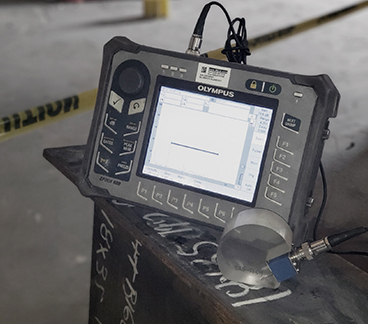Generally consisting of fine and coarse aggregate, cement, and water; concrete is an integral and vital construction material for both shaping and structural support. Concrete samples must be collected and tested by a licensed and accredited laboratory. Concrete testing measures the properties of a sample to help ensure the integrity of the concrete being used. Contingent to design specifications, each sample must meet a wide range of explicit criteria including strength, unit weight, temperature, air content and consistency. Our AASHTO accredited laboratory, complete with fully automated curing room and multiple compressive strength testing machines, is one of few regional labs equipped with diamond plate grinding, enabling compressive strength testing of high-strength concrete cylinders up to 30,000 PSI.
Concrete Testing Services:
ASTM Processes for Concrete
- ASTM C31: Standard Test Practice for Making and Curing Concrete Test Specimens in the Field
- ASTM C39: Standard Test Method for Compressive Strength of Cylindrical Concrete Specimens
- ASTM C42: Standard Test Method for Obtaining and Testing Drilled Cores and Sawed Beams of Concrete
- ASTM C138: Standard Test Method for Density (Unit Weight), Yield, and Air Content (Gravimetric) of Concrete
- ASTM C143: Standard Test Method for Slump of Hydraulic-Cement Concrete
- ASTM C172: Standard Practice for Sampling Freshly Mixed Concrete
- ASTM C173: Standard Test Method for Air Content of Freshly Mixed Concrete by the Volumetric Method
- ASTM C192: Standard Practice for Making and Curing Concrete Test Specimens in the Laboratory
- ASTM C231: Standard Test Method for Air Content of Freshly Mixed Concrete by the Pressure Method
- ASTM C511: Standard Specification for Mixing Rooms, Moist Cabinets, Moist Rooms, and Water Storage Tanks Used in the Testing of Hydraulic Cements and Concretes
- ASTM C617: Standard Practice for Capping Cylindrical Concrete Specimens
- ASTM C1064: Standard Test Method for Temperature of Freshly Mixed Hydraulic-Cement Concrete
- ASTM C1231: Standard Practice for Use of Un-bonded Caps in Determination of Compressive Strength of Hardened Cylindrical Concrete Specimens
- Determination of Water Content of Fresh Concrete Using a Microwave Oven
AASHTO Processes for Concrete:
- ASTM C1542: Standard Test Method for Measuring Length of Concrete Cores
- AASHTO M201: Standard Specification for Mixing Rooms, Moist Cabinets, Moist Rooms, and Water Storage Tanks Used in the Testing of Hydraulic Cements and Concretes
- AASHTO R39: Standard Practice for Making and Curing Concrete Test Specimens in the Laboratory
- AASHTO R60: Standard Practice for Sampling Freshly Mixed Concrete
- AASHTO T22: Standard Method of Test for Compressive Strength of Cylindrical Concrete Specimens
- AASHTO T23: Standard Method of Test for Making and Curing Concrete Test Specimens in the Field
- AASHTO T24: Standard Method of Test for Obtaining and Testing Drilled Cores and Sawed Beams of Concrete
- AASHTO T119: Standard Method of Test for Slump of Hydraulic Cement Concrete
- AASHTO T121: Standard Method of Test for Density (Unit Weight), Yield, and Air Content (Gravimetric) of Concrete
- AASHTO T152: Standard Method of Test for Air Content of Freshly Mixed Concrete by the Pressure Method
- AASHTO T196: Standard Method of Test for Air Content of Freshly Mixed Concrete by the Volumetric Method
- AASHTO 231: Standard Practice for Capping Cylindrical Concrete Specimens
- AASHTO T309: Standard Method of Test for Temperature of Freshly Mixed Portland Cement Concrete
Aggregate is inert granular material such as sand, gravel, or crushed stone that, along with water and Portland cement, is an essential ingredient in concrete. For a good concrete mix, the aggregate elements must be solid, firm, clean, and devoid of chemicals to avoid deterioration of the composite material. Aggregate is divided into two distinct categories: fine and coarse. Fine aggregate generally consists of natural sand or crushed stone, whereas coarse aggregate consists of any particles greater than 0.19 inches. By evaluating the size, texture, weight, and consistency of the samples provided, our laboratory can determine if the aggregate meets the design requirements for the project.
Aggregate Testing Services:
ASTM Processes for Aggregate:
- ASTM C29: Standard Test Method for Bulk Density (“Unit Weight”) and Voids in Aggregate
- ASTM C40: Standard Test Method for Organic Impurities in Fine Aggregates for Concrete
- ASTM C117: Standard Test Method for Materials Finer than 75-μm (No. 200) Sieve in Mineral Aggregates by Washing
- ASTM C127: Standard Test Method for Relative Density (Specific Gravity) and Absorption of Coarse Aggregate
- ASTM C128: Standard Test Method for Relative Density (Specific Gravity) and Absorption of Fine Aggregate
- ASTM C136: Standard Test Method for Sieve Analysis of Fine and Coarse Aggregates
- ASTM C566: Standard Test Method for Total Evaporable Moisture Content of Aggregate by Drying
- ASTM C702: Standard Practice for Reducing Samples of Aggregate to Testing Size
- ASTM D75: Standard Practice for Sampling Aggregates
AASHTO Processes for Aggregate:
- AASHTO R76: Standard Method of Test for Reducing Samples of Aggregate to Testing Size
- AASHTO T2: Sampling of Aggregates
- AASHTO T11: Standard Method of Test for Materials Finer Than 75-µm (No. 200) Sieve in Mineral Aggregates by Washing
- AASHTO T19: Standard Method of Test for Bulk Density (“Unit Weight”) and Voids in Aggregate
- AASHTO T21: Standard Method of Test for Organic Impurities in Fine Aggregates for Concrete
- AASHTO T27: Standard Method of Test for Sieve Analysis of Fine and Coarse Aggregates
- AASHTO T84: Standard Method of Test for Specific Gravity and Absorption of Fine Aggregate
- AASHTO T85: Standard Method of Test for Specific Gravity and Absorption of Coarse Aggregate
- AASHTO T255: Standard Method of Test for Total Evaporable Moisture Content of Aggregate by Drying
Masonry, commonly used in walls and buildings, involves assembling structures by binding individual units together with mortar. Brick and concrete blocks are the most common types of masonry in use, including marble, granite, travertine, and limestone. Generally, masonry is exceptionally durable and substantial. Our laboratory tests material and strength of each block for suitable use.
Masonry Testing Services:
ASTM Processes for Masonry:
- C67: Standard Test Methods for Sampling and Testing Brick and Structural Clay Tile (Brick Absorption, Brick Capping, Brick Compressive Strength, Brick Initial Rate of Absorption, Brick Measurement, Brick Specimen Preparation)
- C140: Standard Test Methods for Sampling and Testing Concrete Masonry Units and Related Units (CMU Absorption, CMU Compressive Strength, CMU Measurement, CMU Sampling)
- C511: Standard Specification for Mixing Rooms, Moist Cabinets, Moist Rooms, and Water Storage Tanks Used in the Testing of Hydraulic Cements and Concretes
- C780 (Annex 1): Standard Test Method for Preconstruction and Construction Evaluation of Mortars for Plain and Reinforced Unit Masonry - Consistency by Cone Penetration
- C780 (Annex 6): Standard Test Method for Preconstruction and Construction Evaluation of Mortars for Plain and Reinforced Unit Masonry - Compressive Strength
- C1019: Standard Test Method for Sampling and Testing Grout
- C1314: Standard Test Method for Compressive Strength of Masonry Prisms
- C1552: Standard Practice for Capping Concrete Masonry Units, Related Units and Masonry Prisms for Compression Testing
With any construction project, it is imperative to establish that the site’s foundation can support the proposed building. Because soil varies in strength, moisture content, composition and type, soil testing is performed to determine each site’s limitations for structural support. Tests provide data evaluating the quality of the soil, assuring builders that the soil is suitable for the project. The AMAA AASHTO accredited laboratory provides the following soil testing services to instill further confidence in our clients regarding specified soil criteria:
Soil Testing Services:
ASTM Processes for Soils:
- ASTM D698: Standard Test Methods for Laboratory Compaction Characteristics of Soil Using Standard Effort (12 400 ft-lbf/ft3 (600 kN-m/m3))
- ASTM D1140: Standard Test Methods for Determining the Amount of Material Finer than 75-μm (No. 200) Sieve in Soils by Washing
- ASTM D1556: Standard Test Method for Density and Unit Weight of Soil in Place by Sand-Cone Method
- ASTM D1557: Standard Test Methods for Laboratory Compaction Characteristics of Soil Using Modified Effort (56,000 ft-lbf/ft3 (2,700 kN-m/m3))
- ASTM D2216: Standard Test Methods for Laboratory Determination of Water (Moisture) Content of Soil and Rock by Mass
- ASTM D2488: Standard Practice for Description and Identification of Soils (Visual-Manual Procedure)
- ASTM D2974: Standard Test Methods for Moisture, Ash, and Organic Matter of Peat and Other Organic Soils
- ASTM D6913: Standard Test Methods for Particle-Size Distribution (Gradation) of Soils Using Sieve Analysis
- ASTM D6938: Standard Test Methods for In-Place Density and Water Content of Soil and Soil-Aggregate by Nuclear Methods
AASHTO Processes for Soils:
- AASHTO T99: Standard Method of Test for Moisture-Density Relations of Soils Using a 2.5-kg (5.5-lb) Rammer and a 305-mm (12-in.) Drop
- AASHTO T180: Standard Method of Test for Moisture-Density Relations of Soils Using a 4.54-kg (10- lb) Rammer and a 457-mm (18-in.) Drop
- AASHTO T191: Standard Method of Test for Density of Soil In-Place by the Sand-Cone Method
- AASHTO T265: Standard Method of Test for Laboratory Determination of Moisture Content of Soils
- AASHTO T267: Standard Method of Test for Determination of Organic Content in Soils by Loss of Ignition
- AASHTO T310: Standard Specification for In-Place Density and Moisture Content of Soil and Soil-Aggregate by Nuclear Methods
Commonly known as pavement or blacktop, asphalt is the most widely used construction material for roadway development. The AMAA laboratory performs the following asphalt testing services to ensure the surface of our roadways, parking lots and foundations are safe for usage:
Asphalt Testing Services:
ASTM Processes for Asphalt:
- ASTM D2726: Standard Test Method for Bulk Specific Gravity and Density of Non-Absorptive Compacted Asphalt Mixtures
- ASTM D5444: Standard Test Method for Mechanical Size Analysis of Extracted Aggregate
- ASTM D6307: Standard Test Method for Asphalt Content of Asphalt Mixture by Ignition Method
AASHTO Processes for Asphalt:
- AASHTO T166: Standard Method of Test for Bulk Specific Gravity of Compacted Hot Mix Asphalt (HMA) Using Saturated Surface-Dry Specimens
- AASHTO T30: Standard Method of Test for Mechanical Analysis of Extracted Aggregate
- AASHTO T308: Standard Method of Test for Determining the Asphalt Binder Content of Hot Mix Asphalt (HMA) by the Ignition Method




